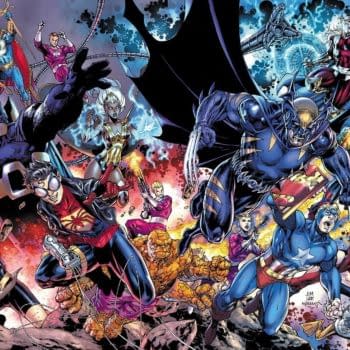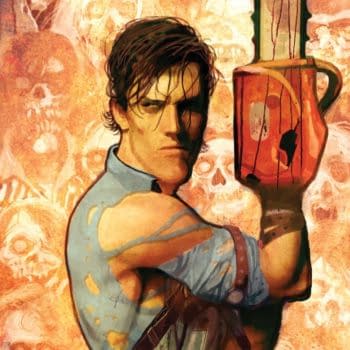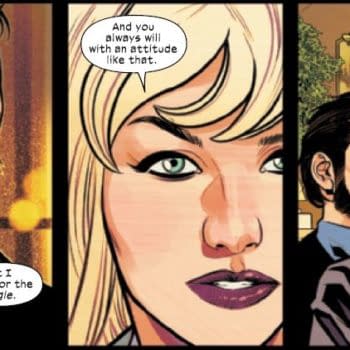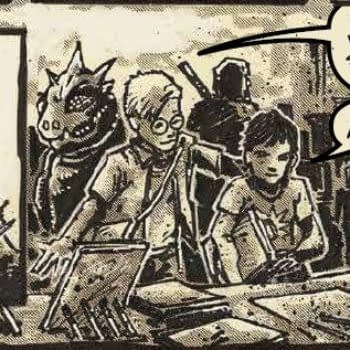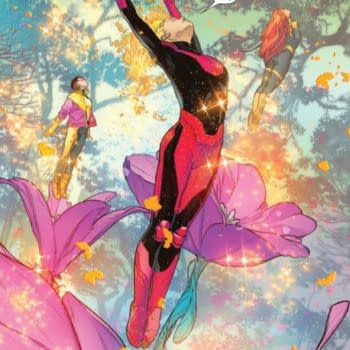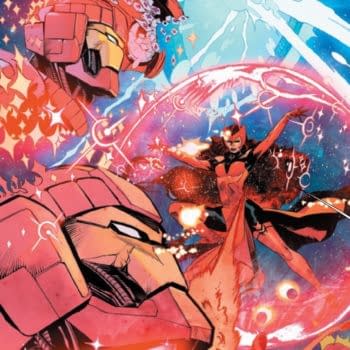Posted in: Comics | Tagged: Comics, comics journal, flex mentallo
In Defence Of Flex

Would you have someone who hates children run a preschool? Would have you have someone who hates talking be the concierge at your hotel? Why would you have someone who hates superheroes write a piece on the penultimate modern treatise on superheroes? Why would I suspect that Rogers hates superheroes? "…in one of the comic's few successful homages to superhero nonsense" Rogers writes when discussing some of the flashbacks to Flex's crime-fighting career. "Superhero Nonsense" is how Flex's history is described. With two dismissive words Rogers assertively shoves capes & cowls comics back into the sandbox where they won't threaten his grad school vocabulary or inflated sense of importance. From Grant Morrison's Supergods, when writing about why he wrote Flex Mentallo, "It was the story of the finest, noblest, most selfless hero of all; an exemplar of a type of hero who had all but disappeared." What Rogers reads as "superhero nonsense" Morrison writes as a way of trying to reverse the tide of pointlessly dark and relentlessly "gritty" comics that had infected the mainstream and become the critical darlings of such high-minded name droppers like Mr. Rogers here. As laid out in his book, there was a point in the history of comics where they were fun spaces for ideas to grow and imagination to run wild, but had been forced into the harsh light of our own bruised reality, therein losing their fun and sense of anything-goes wonder. But there will always be people who will look down their noses at anything that dares to dream or be different, opting instead for the masturbatory reward that comes from dismantling every creative thought bubble to it's bits and pieces to shriek "SEE!? THERE'S NOTHING THERE! I'VE WON!"
Rogers also takes ideas and stories that take issues to fully form and unfurl completely out of context to scoff at, such as Flex's famous feat of flexing so hard he changes the shape of the Pentagon. Rogers dismisses the achievement by saying, "…Flex Mentallo…may succeed for a moment in changing the shape of the system, but the rules by which that system operates, the things it stands for, remain forever unaltered." That simply isn't so. Again, from Supergods, "With one tremendous curl of his bicep, he had transformed the Pentagon into a circle…thereby negating its occult energies." So it did do something within the context of the story. There are critics who slam Aesop Rock for just saying things to say them and not making any sense. There will always be people who don't do the work of trying to understand and then insist that it's the artist's fault. Whether you read books by Tucker Max or Karl Marx, people will always attack what they don't understand.
It seems at times that Rogers is almost purposely misreading Flex Mentallo. Wally Sage, the main character of the story recounts an experience of reading an "adult" comic when he was young and that it scared him so much he dared to think "I knew I shouldn't have read those 'adult' comics". Rogers reads the scene of a young person traumatized by a horror comic aimed at an older demographic as, "Even shorter shrift is given to 'adult' comics (by which I can only guess Morrison means to indicate undegrounds-the book provides scant details. These are apparently even more morally corrupt and baneful than the plague of dark superheroes….So much for the source of every major aesthetic achievement in comics over the last half century." Yes Mr. Rogers. That's exactly what Morrison meant. What he really meant to say was "I hate 'Love and Rockets' and think Harvey Pekar is a dick." If you gave a copy of Neonomicon to a 13 year old, he'd probably have trouble sleeping. Probably because he looks down his nose at the works of R. Crumb.
Another criminal fault in the work is the fact that the book about the history of superhero comics and how it relates to Grant Morrison's personal development is only about the history of superhero comics. I like to imagine Mr. Rogers picking up a cook book and then angrily rushing to his ipad to bang out, "This cookbook said nothing about mixing drinks. 0 stars."Flex Mentallo is in part the history of superhero comics, from Grant's Supergods, " Each of the four issues took its thematic cue from a different age of comics." In fact Rogers even admits this earlier in his rambling diatribe where every paragraph might as well begin "AND ANOTHER THING!". What this means is that despite the fact that Rogers understands the focus of the book, he's still mad because why would anyone take superheroes seriously to begin with?
"The closest we get to reality, in Flex Mentallo, is…" Again Rogers shows his hand and complete inability to understand anything that doesn't conform to his narrow perception of comic books. One of the major themes of Flex Mentallo is the idea that the comics reality is better than our own. Why is it a fault of the work that it fails to be "real enough"? FromSupergods, "Rather than succumb, as the Watchmen characters did, to real-world pressures, [Flex] would overcome them with the sheer power of muscle mystery."
Rogers can only halfheartedly compliment artist Frank Quitely before pissing all over his Flexpages. In a truly hilarious move, after shitting with the fury of Gary Groth at a Jim Shooter birthday party all over the work for paragraph after paragraph, Rogers moves on to dumping on DC's production quality of the hardcover itself. "The new color job turns a Silver Age villain, motley-colored in the original, into dead, dull gray; it takes those moments of oblivion and transcendence and stains their pure fields of whiteness with urine-yellow gradients…" And on and on and on. "This soup is terrible! And the portions are so small!". Especially rib tickling about this particular "And another thing!" cryfest is Rogers' reference to the "transcendence" of the comic. This same "transcendence" about which earlier Rogers says, "does Morrison actually believe this cack?"
For all the pompous self-fellating Rogers does himself in this interminable screed of dull, uninspired, intellectual snobbery, the crowning achievement (in Rogers' mind) has to be when he goes through a laundry list of what he perceives to be Morrison going back on his own testament in the years that followed Flex's publication. "So, yes, the principles voiced everywhere in Flex Mentallo would have us disapprove when superheroes shrug off genocide with a joke (New X-Men), when Kirby characters get murdered just so the plot has a MacGuffin (Final Crisis), when porn sites pop up devoted to teenage girl heroes (7 Soldiers), or when a villain tortures his victims before performing invasive surgery on their faces (Batman and Robin)." The "shrugged off joke" of which he speaks would be Beast's "gallows humor", which the character willingly adresses as such, for a brief moment before the rest of the comic is dedicated to searching for survivors and trying to create a memorial. The Kirby character's death of which he speaks (Rogers must not have read Supergods which honestly could be subtitled, "Jack Kirby: A Love Story" considering how many pages Morrison dedicates to worshiping the man and his entire body of work) happens to the Martian Manhunter, at the very beginning of the story, a story which will end with Superman making a wish for a happy ending and saving the day. Trying to write off 7 Soldiers with one minor plot point taken entirely out of context is embarrassing. It's on the same level of saying that The Sandman is just a story about serial killers at a convention. Finally his Batman & Robin trump card again displays his proud ignorance of the books he's reading, for again, in the end Batman & Robin will save the day. Just like in Flex Mentallo.
So for Mr. Rogers, among Grant Morrison's many crimes are:

1. His inability to bring any "real world" reality to his fantasy comics.
2. His insensitive, gruesome, dark, "real world" reality in his fantasy comics.
So forget about the rest of his chinese-finger trap of conflicting, obtuse reasoning. Don't even bother getting upset as Rogers mocks the pain that the suicidal Wally Sage goes through. Don't take note as he gleefully rips apart Morrison for daring to use made-up, fantastical sounding words in his made-up, fantasy comic, especially when Morrison is writing about an age of comic book story telling where that kind of narrative was the norm. People will always act like superhero comics are something to be embarrassed and ashamed of, but don't let their fragile insecurities and intellectual disdain ruin one of the finest modern comics ever produced.






